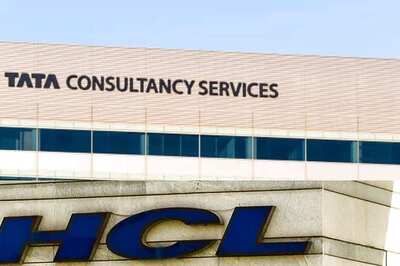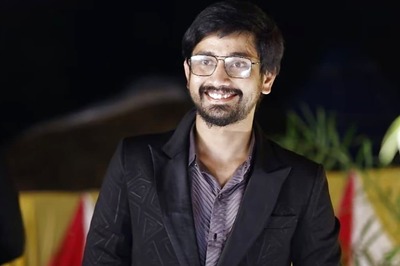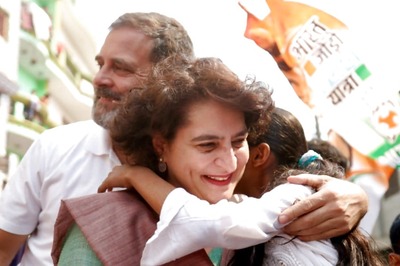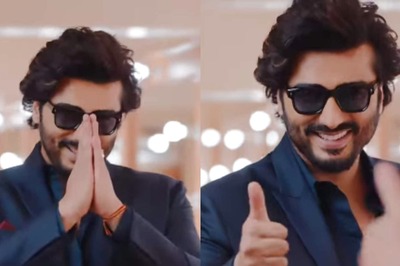
views
New Delhi: Foreign affairs was not expected to be Prime Minister Narendra Modi’s forte as the visa ban on him by several western nations was seen as a major stumbling block. But in the last one year Modi laid to rest all doubts and reached out to all major nations along with India’s neighbours.
India always had a troubled neighbourhood but Modi right for inviting all South Asian Association for Regional Cooperation (SAARC) heads of states and then visiting many bordering nations has played his cards right. From the little Himalayan kingdom of Bhutan to communist China, the Prime Minister crisscrossed the world and the only major neighbours where he is yet to set his foot are Pakistan and Bangladesh.
His first foreign tour was Bhutan which has often been neglected in the past as all eyes have always been on the bigger nations.
Bhutan
On his maiden trip, Modi visited Bhutan on June 15, 2014 to launch a drive to reassert Indian influence in the region, offering financial and technical help, and the lure of a new market.
The tiny Buddhist nation, wedged in the Himalayas between India and China, is the closest India has to an ally in South Asia, a region of bristling rivalry where China is making inroads.
During his two-day visit, Modi inaugurated one of India's assistance projects - the building of the Supreme Court of Bhutan and laid foundation stone of the 600MW Kholongchu Hydro-electric project, a joint venture between India and Bhutan.
Terming Bhutan as natural choice of his first visit because of the "unique and special relationship", Modi had said the focus of his trip was on making development cooperation "even more effective".
Modi visited Bhutan at the invitation of King Jigme Khesar Namgyel Wangchuk and Prime Minister Tshering Tobgay.
Modi choosing Bhutan as his first foreign destination assumed significance as China has lately intensified efforts to woo it and establish full- fledged diplomatic ties with Thimphu.
Nepal
Modi visited Nepal twice in one year. Firstly, he went to the country for a two-day visit on August 3, 2014 and then to attend the 18th SAARC Summit in November.
In a visit by Indian Prime Minister to Kathmandu in 17 years, Modi was received by his Nepalese counterpart Sushil Koirala at the airport. The major areas of cooperation included security cooperation across the open border, trade and investment, hydropower and infrastructure.
Modi met Koirala, President Ram Baran Yadav and addressed Nepal's Constituent Assembly, which serves as its Parliament. He also offered special prayers at Nepal's famed centuries-old Pashupatinath Temple and 'felt extremely blessed'.
There was also a controversy over Modi's humanitarian act for reuniting one Jeet Bahadur Sarumagar with his family after 16 years. The Facebook profile of the Nepal boy revealed that Sarumagar met his family two years ago. There are several pictures and posts as an evidence for that.
In his second visit to the country, Modi attended the SAARC hosted by the Government of Nepal in Kathmandu on November 26-27, 2014. Modi met SAARC leaders during the visit and discussed ways to expand co-operation for the larger interest of the region.
Modi began his two-day visit to Nepal with the inauguration of Trauma Centre in Kathmandu's Bir Hospital. Modi held talks with his Nepalese counterpart Sushil Koirala on key strategic issues after which ten agreements, including a pact on USD 1 billion assistance to Nepal, were inked.
Modi along with Koirala also inaugurated the Kathmandu-New Delhi bus service.
Myanmar
In his sixth visit abroad, Modi visited Myanmar on November 11, 2014 to attend two key multilateral summits- ASEAN & East Asia Summits. He was the 12th Indian Prime Minister to participate in ASEAN Summit in Nay Pyi Taw and 13th Prime Minister to participate in East Asia Summit in Nay Pyi Taw.
The Summit was an opportunity to engage with the Leadership of ASEAN nations and to deepen engagement both as a group of nations and with each nation individually.
Modi insisted on better connectivity, more trade and increased cooperation with the ASEAN and East Asian countries. The black money issue was raised by Modi as many of the countries visiting the ASEAN and the East Asian Summit in Myanmar are those where there are substantial amounts of India's black money.
He also addressed the Indian Community in Myanmar, at a reception hosted by the Indian Ambassador, at Nay Pyi Taw.
Mauritius
Modi went to Mauritius for a two-day trip on March 11 and 12 where he had extensive meetings with his counterpart Sir Anerood Jugnauth, to further enhance the special and unique relations. Modi was the Chief Guest at Mauritius's National Day celebrations and also addressed the National Assembly.
India and Mauritius agreed to push forward their negotiations for a long pending revision of Double Taxation Avoidance Treaty (DTAT), asserting that their objective was to prevent the "abuse" of the convention.
Modi and Jugnauth expressed this resolve during their talks even as India offered $500 million concessional line of credit to this key island nation for key infrastructure projects.
The two countries also signed five agreements, including one on developing ocean economy. On other key bilateral economic issues, Modi said the two countries should resume their discussions on Comprehensive Economic Partnership Agreement.
Sri Lanka
Modi visited Sri Lanka on March 13 and 14 and held meetings with President Maithripala Sirisena and Prime Minister Ranil Wickremesinghe. He addressed a special sitting of the Sri Lankan Parliament and also laid a wreath at the Indian Peace Keeping Force (IPKF) Memorial and visited Mahabodhi Society, Anuradhapura, Talaimannar & Jaffna.
The Prime Minister, who is also the second international leader to visit the once strife-torn region after Premier David Cameron in 2013, handed over 27,000 new homes to Tamils who became homeless during the civil war.
During his Sri Lanka visit, the first by an Indian Premier in over 25 years, Modi reached out to the country, saying the security of the two nations is "indivisible" and favoured a life of equality, justice and dignity for Tamils in its "new journey" of peace and reconciliation.
He had also urged the Sri Lankan government to ensure early and full implementation of the 13th Amendment relating to devolution of powers to Tamils and to go beyond that in finding a political solution. Laying the foundation for a Cultural Centre being built in Jaffna by India, Modi said, "Sri Lanka should also progress. Unity, peace and amity are essential ingredients for equitable development where there is respect for all citizens."
Modi also flagged off a train service in the north-western town of Talaimannar -- the closest point to India -- restored after decades of civil war, completing the reconstruction of the entire Northern Province Railway Line.



















Comments
0 comment